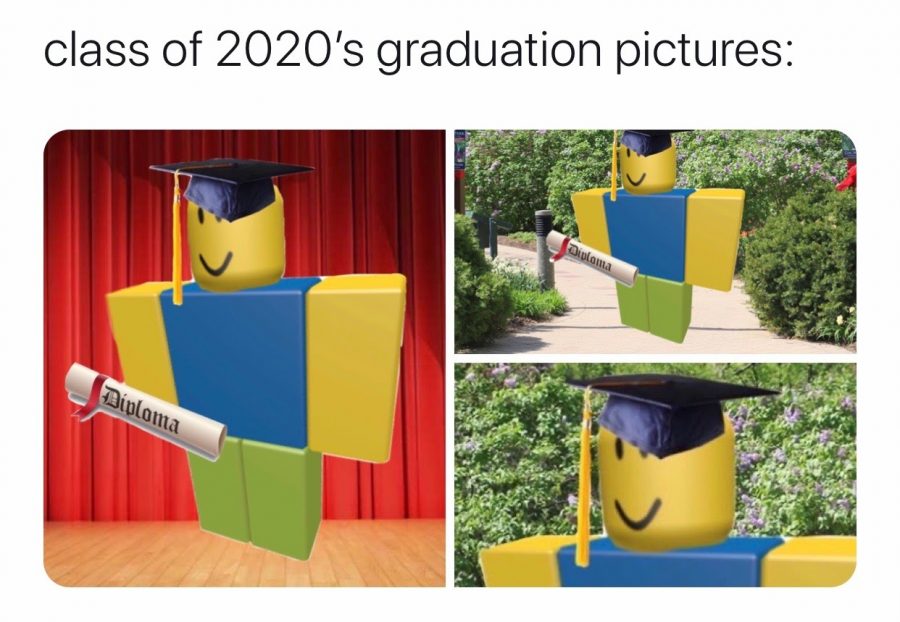Many 2020 graduates have made jokes on social media about having an online graduation ceremony through the online game Roblox.
How students use social media during a pandemic
May 4, 2020
As the spread of coronavirus continues to impact the everyday lives of people all over the world, the dark-humor of students, but especially seniors at Glenbard East, is now more notably mixed with anxiety about the less-secure state of Graduation and deep disappointment following the cancellation of Prom in May.
On popular social media platforms, encountering content making light of the seemingly precarious state of the world is not uncommon. On Instagram, Twitter, and the increasingly popular app Tik Tok, younger Millennials and Gen Z individuals have cracked endless amounts of jokes and never-ending memes related to their experiences during this pandemic.
This dark humor is evident when users refer to the deadly coronavirus as, simply, “Miss Rona”. One of the many memes being cycled through Tik Tok involves a user saying that they heard one of the symptoms of COVID-19 is losing the sense of taste. The dark punch-line comes when they follow this up with the question, “How are people whose favorite show is Friends doing?”, for instance.
When asked about student’s dark-humored response to the pandemic, senior Mia Dalesandro indicated that the Gen Z tendency to make light of the serious developments of the coronavirus is appropriate. Both Morely and Dalesandro agreed that the online memes and jokes that have transpired on various social media sites were, in fact, funny. Sharing how daily life has changed amid the outbreak offers a sort of camaraderie in cracking dark jokes among young people.
During the early weeks following school closures, many students joked about the possibility of having Prom or Graduation over Zoom or even through the online game Roblox. Since then, Glenbard East has announced that there will be a virtual graduation ceremony in May. What began as anxious jokes have now become serious concerns for seniors whose last year has been abruptly cut short. Senior Kelsey Morley stated, “Gen Z won’t take [the situation] seriously until it hits us.”
The widespread use of social media during times of shelter-at-home orders and social distancing have had large implications of student’s ability to stay focused throughout the day. Sophomore Henna Ayesh described the difficulty of balancing e-learning with the distractions of social media. She stated, “since school is online, it has become harder because I’ll get notifications from YouTube or Instagram” which are Ayesh’s first choices of apps to visit.
She described the experience of seeing a notification, spending hours on an app, and realizing she still has not started her homework as frustrating and difficult to deal with. Admittedly, the first thing she does after waking up and before going to bed is scrolling through social media.
For Ayesh and many other young people, social media is not so much a pesky disturbance but a kind of virtual sanctuary from a serious situation. Without the internet or social media, Ayesh wonders what she would do throughout the day.
“When you spend every single day trapped inside your house with not much to do, social media kind of keeps you busy.”
Even after hearing the disappointing news of event cancellations and struggling through e-learning, the jokes and dark-humor continuing to thrive among students is quite the curious phenomenon. The way that young people are acting indicates that social media may have evolved from a way to stay connected with friends and family to an environment where new, widespread connections can be made through shared experiences…such as a global pandemic.
